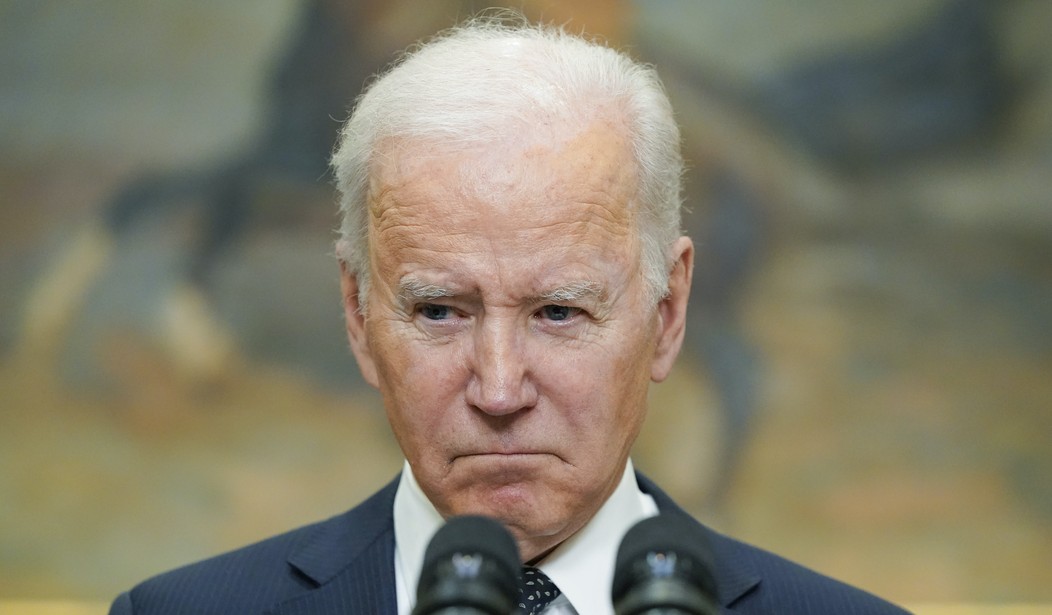At practically any point in the past 15 years, I would have told you that SCOTUS overturning Roe v. Wade would be a major factor in the next election, whenever that election happened to be.
But inflation was a remote prospect in America during those 15 years. Almost a myth.
As it is, I’ve begun to wonder if rising prices might end up achieving something I would have otherwise thought impossible.
They may “Roe-proof” the midterms for Republicans.
This CNN poll is so gory for Biden and his party that it should be rated NC-17:
Only 23% rate economic conditions as even somewhat good, down from 37% in December and 54% last April. The last time public perception of the economy was this poor in CNN’s polling was November 2011, when 18% called economic conditions good…
Although economic pessimism is most pronounced within the GOP, it spans party lines. A near universal 94% of Republicans rate current economic conditions in the US as poor, as do 81% of independents and 54% of Democrats…
The economy remains a notably weak spot for the President. Biden’s overall approval rating holds steady: 41% of Americans approve and 59% disapprove, effectively unchanged from CNN’s last poll, conducted in January and February. But his economic approval numbers continue to tick downward, with 34% now approving and 66% disapproving, compared with 37% approval and 62% disapproval earlier this year. Biden’s ratings have also continued to sink on the issue of helping the middle class (36% approve, down from 41% in February) and on immigration (34% approve, down from 40% last December).
Inflation isn’t all Biden’s fault but it’s partly his fault per last year’s blowout COVID relief spending package, and the public knows it. Fifty-five percent say his policies have made the economy worse. In December, by comparison, only 45 percent said so. Americans are growing more inclined to hold him responsible for their economic pain, just as they’re also growing more inclined to see the economy as the country’s most pressing problem. Six months ago, 36 percent of Americans ranked the economy as the most important issue. Now, 50 percent do.
How do you ask a swing voter to overlook the fact that everything’s more expensive under Biden and vote Democratic this fall because of abortion? Even if you’re a swing voter who’s open to the argument, what are you supposed to make of the fact that Democrats had total control of government in 2021 and 2022 and couldn’t find the votes to pass some sort of national abortion law? What would be the point of helping them retain their majority?
I was thinking this morning: When was the last time a midterm looked this hopeless for the ruling party? Don’t say 2010. Although ObamaCare seemed like it would be a major albatross for Dems, they continued to hold out hope that voters would warm up to the bill that summer and fall as they became better acquainted with it. Don’t say 2018 either. Trump’s low approval rating made major Democratic gains likely, but he had the benefit of a strong economy, a political advantage never to be underestimated.
In most midterms, even ones that end up as landslides, the party in power usually has something going for it well into the summer that could semi-plausibly restore its fortunes before Americans vote. There’s none of that this year. It’s the middle of spring, with Roe set to topple at any moment, and Democratic strategists are already using words like “bloodbath” to describe what’s coming. I’ve never seen a partisan political cause so hopeless. And so hopeless so soon.
But that’s inflation for you. All sides grasp that the problem is largely out of Biden’s hands at this point, with COVID in China and war in Ukraine now contributing to the global price crunch. The key federal actor isn’t even the White House but the Fed, which ordered the largest interest rate hike in more than 20 years today in hopes of shocking the economy into cooling down. If history is precedent, they’ll end up shocking it straight into a recession, an even bigger political disaster for Biden.
Imagine being Tim Ryan, widely regarded as a formidable Democratic nominee for Senate in Ohio. He’s got congressional experience and he talks a good working-class game, which gives him a puncher’s chance in a state that’s elected Sherrod Brown three times. In a normal midterm I’d give him a one-in-three shot at beating J.D. Vance, a newbie candidate with plenty of vulnerabilities. But in a national environment this poisonous for Democrats?
Five percent chance, maybe? Maybe not even. Check this out:
You can chalk some of those Ohio numbers up to the fact that the Republican Senate primary was super-competitive while the Democratic Senate primary wasn’t. But a 50 percent net difference between the two parties in turnout trends?
Any Republican running in a district that broke for Biden by less than, say, seven points in 2020 is going to have to try to lose this fall. It’ll take real effort.
Exit question: Is the cure for what ails Dems having Gavin Newsom out there on the trail ranting about abortion pills or whatever? I feel like … no.








Join the conversation as a VIP Member